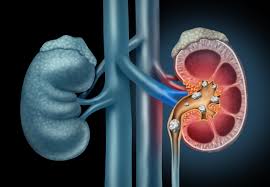Kidney Stone
—Specialisation

Kidney stones are solid crystals in the kidney. These stones are formed whenever there is too much waste in and your body lacks blood. Due to this the waste sticks and gets collected in your kidneys. Altogether these lumps form kidney stones.
Kidney stones can develop mostly in urinary tracts. It may be in any of its parts. These parts can be kidney, urethra, bladder, and ureters. Kidney stones are known to be a painful medical condition. The intensity of pain may vary with the type of stone.
The relieving part is that there exists a treatment for curing kidney stones. In this post, we have mentioned the ways through which kidney stones can be treated.
Kidney stone symptoms
It is very important to know about the symptoms of kidney stones. Observing these symptoms is important if they are visible in your body. This would help you take the right treatment at the right time.
If there is a small stone then you may not observe any symptoms. Also, such small-sized stones will pass through the urinary tract.
If you have large-sized stone then you may observe the following symptoms:
- Vomiting and nausea can be a visible symptom
- You may experience pain while urinating
- You may observe blood while urinating
- There may be a sharp pain in the abdomen or back
If you observe such symptoms then it may be possible that you have kidney stones. In such a situation you must seek appropriate treatment.
Kidney stone treatment and medication
Treatment of kidney stones depends upon the type of kidney stone the person has. The first step towards treatment is the collection of urine and the stones can be evaluated.
The treatment may also depend on the size of the kidney stone. Various other treatment and medication are as follows:
Medication
Narcotic medication can help in relieving pain caused due to kidney stones. The doctor can prescribe antibiotics as a part of the treatment. Various medication that is included as a part of medication are:
- Ibuprofen, acetaminophen and naproxen sodium for pain
- thiazide diuretics and phosphorus solutions to prevent stones from forming from calcium
- allopurinol for stones caused due to uric acid
- sodium bicarbonate for reducing acid effect in urine
Tunnel Surgery
The medical name of this treatment is percutaneous nephrolithotomy. In this kind of treatment, the surgeon removes the stone with the help of incision in the back of the patient.
This treatment is undertaken in several circumstances. Some of them are:
- The size of the stone is too big to pass
- The pain is unbearable
- The stone is causing damage to the kidney
Lithotripsy
In this kind of treatment, shock waves are used for breaking the large-sized stones. This is done so that the pieces of stone can easily pass through the uterus to the bladder.
This process requires the use of anesthesia as it can be an uncomfortable and painful process. You can even notice bleeding around the key and bruising on the abdomen.
Ureteroscopy
If you have a stone stuck in the bladder or ureter then the doctor may use an ureteroscope for removing the stone. This process involves the insertion of a small wire with an attached camera into the urethra. It is passed to the bladder.
The doctor then uses a small cage for removing the stone. The stone is sent to the laboratory for further analysis.
Conclusion
You learned about the various treatments of kidney stones. The treatment is painful and staying with it also. Thus, to avoid these treatments is to prevent kidney stones.
There are many ways through which you can prevent kidney stones. This includes proper hydration, more urine passes out, an increase in fluid intakes like juices and lemon water, eating oxalate-rich foods, and many more.
Also, many doctors provide preventive medications for kidney stones. This generally happens when you are at the risk of having kidney stones.
